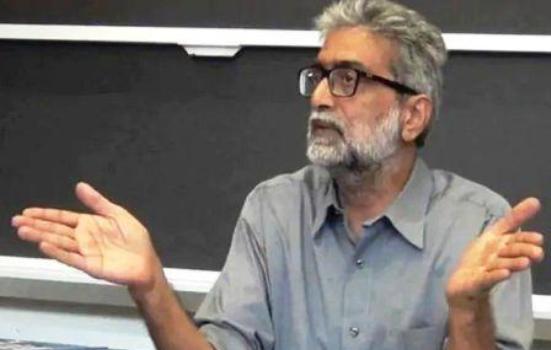Sushree Mohanty
The Supreme Court is set to hear an appeal case recorded by activist Gautam Navlakha challenging the Bombay High Court judgment.
The plea was filed by Navlakha in response to the Bombay High Court’s verdict to dismiss his request which contended that he should be allowed default bail by considering his 34-day house detainment earlier.
A two bench judge comprising of Justices UU Lalit and KM Joseph posted the matter for further hearing on the request of the National Investigation agency who pleaded for additional time for documenting a counter affidavit to Navlakha’s request
Senior Advocate Kapil Sibal, representing Navlakha, presented that a counter affidavit is not required since the matter includes questions of law.
Notwithstanding the contentions, the bench acknowledged the solicitation made by Additional Solicitor General S V Raju for allowing time to record counter affidavit statements.
“Since the man is under detainment, you need to speed up the process. We will have the hearing next Monday”, Justice Lalit stated.
While issuing directions to the National Investigation Agency to submit a counter affidavit by March 19, Justice Lalit added that “It is just an issue of law whether the house-detainment period is to be incorporated for the reasons for Section 167 CrPC”,
The Bombay High Court, in its verdict, had held that the 34-day house detainment of Navlakha cannot be included for estimating the time frame for documenting charge sheet and applying for a default bail.
The High Court observed that the period of time for the detainment was held to be illegal by the Delhi High Court because of the violations of the compulsory conditions for detainment.
The High Court further observed that such time of illegal arrest cannot be incorporated while estimating the 90 days time frame recommended for award of default bail under section 167(2) of the Criminal Procedure Code (CrPC).
The Court further held that there was no confusion about the fact that Navlakha was under house detainment, during which he was granted permission to talk with his family members and legal counsellors only.
The investigation officers did not have the authority to interrogate or investigate him, as the Court had directed the police to keep Navlakha in the same spot from where he was captured.
The court held that under section 167 (2) of the Code of Criminal Procedure, a detention is lawful only when approved by a magistrate, and 90 days from that day will be used to compute the time of capture for default bail.
“When the authorisation by the Magistrate is announced illegal and therefore delivering the real detainment unlawful, the said period (house arrest) cannot be understood to be an approved custody inside the significance of Section 167(2) of CrPC”, the court said.
The High Court bench comprised of Justice SS Shinde relied on the verdict of Chaganti Satyanarayan and others versus State of Andhra Pradesh where the Supreme Court held that the time of 90 days or 60 days, will start counting from the date of remand and not from any other date despite the way that the accused may have been arrested before by a personnel and denied of his freedom.
The court further stated that,” A Magistrate can, accordingly, approve the detainment of the accused for a maximum period for 15 days from the date of remand and place the charged either in police custody or in legal custody during the time of 15 days’ remand. It has, in any case, to be borne as a main priority that if an accused is remanded to police custody the maximum period during which he can be remanded in police authority is 15 days. Past that period no Magistrate can approve the detention of the accused in custody”

